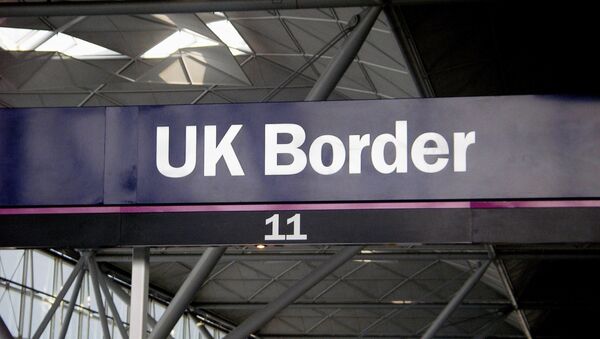The number of European Union nationals deported from the United Kingdom has spiked following the Brexit vote.
Professor Eleanor Spaventa, Chair in European Law at Durham University, said the Home Office appeared to want to reduce immigration in general.
She said it used to be quite rare for EU citizens to be deported but she said there seemed to be a semi-official policy to create a "hostile" environment for some Europeans.
"They started deporting rough sleepers and people who were in more vulnerable situations. The legal grounds for deportation are to be found in EU law. One ground is if you don't have a job and you are not economically active, and the other is if you are a threat to public security, for example if you are a terrorist," she told Sputnik, but added that there were a lot of safeguards to prevent unwarranted deportations.
Analysis of the data revealed that nearly 5,000 EU nationals have been forced to leave Britain over the past year.
The data suggests the number of deported EU citizen rose by 14 percent in 2016 and constituted a fivefold increase compared to the figures for 2010.
The enforced removals of EU citizens increased by 26 percent in the first three months of 2017, compared to the same period last year.
The rise comes despite a considerable drop in the total number of people being deported.
Prof Eleanor Spaventa @DurhamLawSchool is today addressing @EP_Petitions about #EU & #UK #citizensrights #Brexit https://t.co/jAZqcJBLnN pic.twitter.com/zhQyuUQnFY
— Durham University (@durham_uni) 21 June 2017
'Administrative Removal'
Prof. Spaventa said the British government had created a new idea and was deporting many of the EU nationals under what is termed "administrative removal".
She said many of these deportations would be challenged.
"Challenges are already pending in front of UK courts and they may well decide to ask the European Court of Justice to adjudicate because for most of legal analysts this is illegal," Prof. Spaventa told Sputnik.
She said it would be very difficult for unskilled workers from EU countries to come to Britain and it might be very hard for the hospitality industry, for example, to find workers.
Prof. Spaventa said the idea had been floated of two-year visas for EU nationals but she said this would be "unpalatable" to many people as it would not give them the security necessary to settle down.
"It is not obvious to me, or many business analysts, that the UK economy could survive with such a system because the UK economy relies quite a lot on European workers coming to contribute to the UK economy," she told Sputnik.
"But for Brexit to be reversed you need the political will of the UK government and at the moment you cannot see that," Prof. Spaventa told Sputnik.
She said the UK government's whole narrative on Brexit was becoming "toxic" to the negotiation process.



